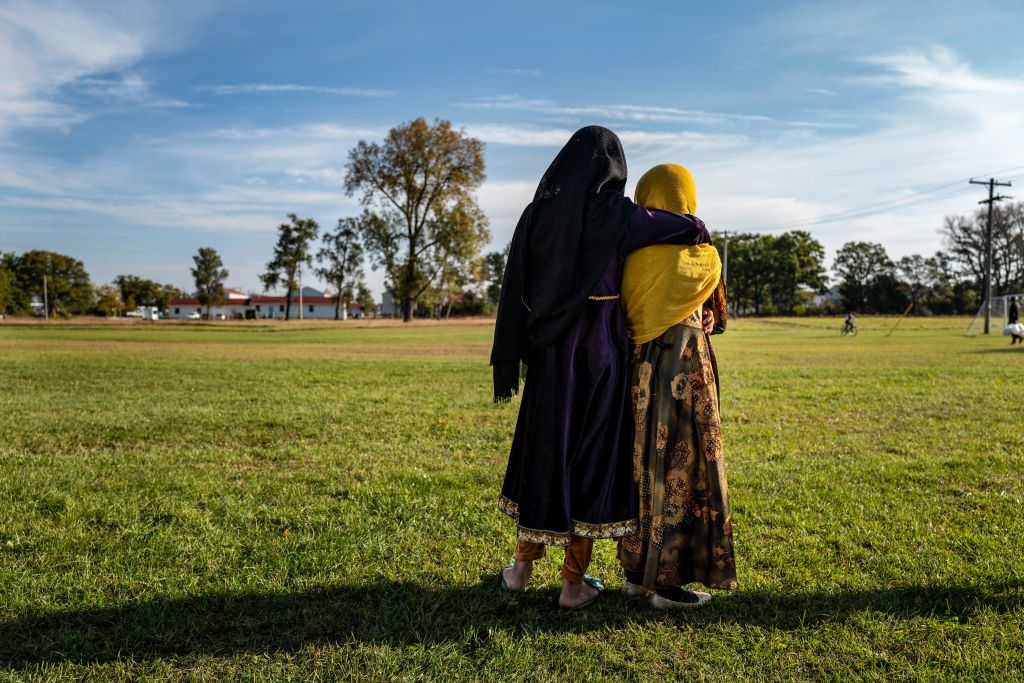
The Biden Administration will now allow Afghans in the U.S. to apply for Temporary Protected Status (TPS), a designation that would protect them from deportation for 18 months, grant them a work permit, and give them authorization to travel.
The Department of Homeland Security (DHS) estimates that 72,500 Afghans already in the U.S. will qualify for TPS. This won’t affect Afghans trying to access the U.S. who remain abroad, and doesn’t guarantee permanent stay in the U.S. for those who are already here.
“[TPS is] yet another short term band-aid for a population that needs and, frankly, deserves some kind of protection,” says Krish O’Mara Vignarajah, president and CEO at Lutheran Immigration and Refugee Service (LIRS), a refugee resettlement organization. “Our nation made a promise that we would safeguard them in return for their service and sacrifice, we can’t put an expiration date on that promise. And we can’t leave them to be subject to the whims of future administrations.”
When the U.S. withdrew from Afghanistan in August 2021, it began the evacuation of thousands of Afghans. Ultimately, nearly 80,000 were evacuated and permitted to remain in the U.S. under a designation known as humanitarian parole. DHS first announced it would begin to offer TPS to Afghans on March 16, but it first had to go through a process of publishing the designation in the Federal Register. That publication came on Friday, opening the door to TPS for Afghans.
TPS doesn’t offer the same benefits that refugee status would, including a permanent path to residency in the U.S. But it may offer a temporary solution to a looming crisis: Afghans’ humanitarian parole status is only good for two years. It would take an act of Congress to adjust their humanitarian parole status so that they can apply for a pathway to citizenship. Barring that, many Afghans will likely find themselves pursuing asylum claims, which would put them in the middle of the kludgy immigration court system that is already backlogged by more than 1.6 million cases as of January. Allowing Afghans to apply for TPS provides a way for them to stay in the country longer with the opportunity to seek asylum.
But as the name suggests, TPS protections are temporary. For Afghans who have been in the U.S. as of March 15, TPS will protect them from deportation for 18 months. It is at DHS’s discretion to decide what countries to add to the TPS eligibility list—Afghanistan joins 13 other countries including Ukraine, South Sudan, and Haiti— and when or whether to let benefits expire. In some cases, DHS has extended TPS protections for decades, renewing the designation each time the expiration date nears, a cycle advocates say they worry could trap Afghans.
“It’s a temporary status, so there’s no security for people,” says Robyn Barnard, senior policy council of refugee protection at Human Rights First, an advocacy and research organization. “To be living constantly in these 18-month windows is really not fair and sustainable.”
‘We are going through trauma’
Humaira Rasuli, a human rights lawyer and Afghan woman who evacuated the country during the U.S. withdrawal and now resides in Virginia, says she is among the lucky ones. Not only did she receive humanitarian parole, but she also has qualified for a Special Immigrant Visa authorized for certain Afghan nationals for working with American forces, which puts her on a pathway to citizenship.
But there are still thousands of others in the U.S. who haven’t received the same protections, she says, and thousands more abroad who are in danger—including members of her family. “For those of us that are out of the country… we have some guilty feelings,” she says. “We are among few that are protected and safe, and the majority of Afghan people, especially women, are not safe.”
Rasuli says she’s found a welcoming home in Virginia, but her parents and sisters remain behind in Afghanistan. Their attempts to join her in the U.S. have so far failed, and the new ability for Afghans in the U.S. to apply for TPS doesn’t aid those who are left in Taliban-controlled Afghanistan or who have fled to other countries and submitted applications for entry to the U.S. under humanitarian parole. “All of the time we are going through trauma, one trauma after another,” Rasuli says. “You are in constant fear of something happening. Believe me, if my parents don’t write me in a day, I already feel that they are kidnapped, or they are harmed.”
U.S. Citizenship and Immigration Services (USCIS), the agency that processes humanitarian parole requests for Afghans abroad, is backlogged processing tens of thousands of applications. And so far, Congress has failed to pass more permanent protections for Afghans. The Afghan Adjustment Act would permit Afghans with humanitarian parole in the U.S. to apply for permanent residency. The bill has bipartisan support, but advocates’ most recent effort to attach it to a new $40 billion aid package for Ukraine failed.
For now, TPS has become the latest stopgap measure. “While TPS is a welcome safety net, it doesn’t mean we should keep kicking the can down the road,” says Vignarajah of LIRS. Every time Congress “fails to act on this, is another extension of the anxiety our new Afghan neighbors face.”
More Must-Reads from TIME
- Donald Trump Is TIME's 2024 Person of the Year
- Why We Chose Trump as Person of the Year
- Is Intermittent Fasting Good or Bad for You?
- The 100 Must-Read Books of 2024
- The 20 Best Christmas TV Episodes
- Column: If Optimism Feels Ridiculous Now, Try Hope
- The Future of Climate Action Is Trade Policy
- Merle Bombardieri Is Helping People Make the Baby Decision
Write to Jasmine Aguilera at jasmine.aguilera@time.com